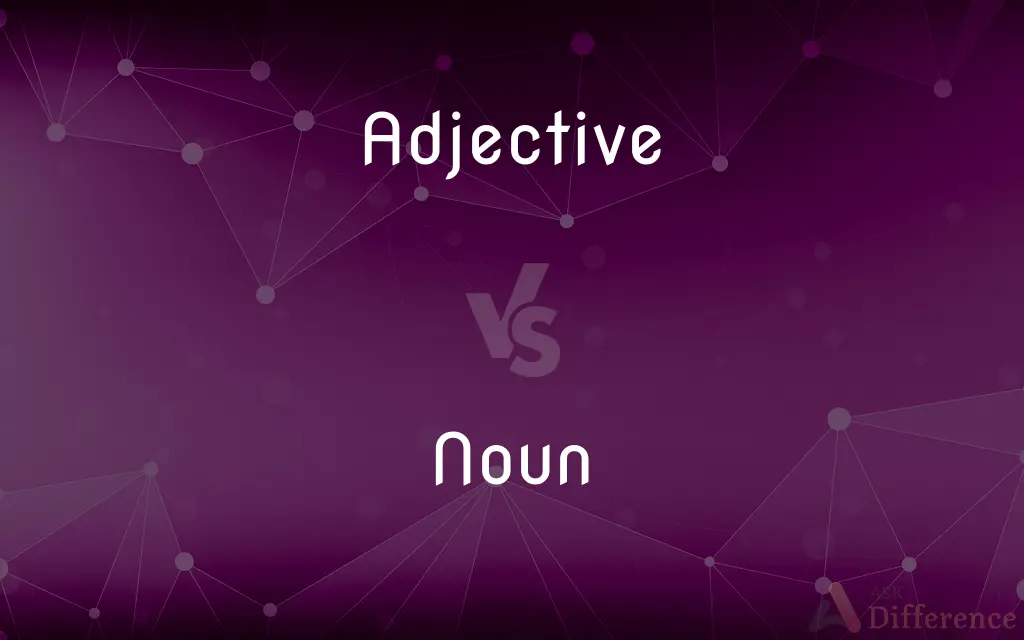Adjective vs. Noun — What's the Difference?
Edited by Tayyaba Rehman — By Fiza Rafique — Updated on April 15, 2024
Adjectives modify nouns to specify characteristics (e.g., green, large), while nouns name people, places, things, or ideas (e.g., car, joy).

Difference Between Adjective and Noun
Table of Contents
ADVERTISEMENT
Key Differences
An adjective serves to describe or modify the qualities of a noun, adding detail to help visualize or understand it better. For instance, in "red apple," "red" describes the apple. On the other hand, a noun identifies a subject or object in speech or writing, representing people, places, things, or concepts. Examples include "apple" which can be described by various adjectives.
Adjectives can specify quantity, quality, size, condition, or show possessive form, enhancing the noun's meaning. For example, "several books," "beautiful scenery." Whereas nouns can function as the subject or the object of a verb, and can be common, proper, concrete, abstract, countable, or uncountable, such as "books" or "information."
Adjectives are always used in conjunction with nouns and cannot stand alone in a sentence as the main subject or object. For example, "happy" must describe someone or something. In contrast, nouns can stand alone as the main subject or object of a sentence, such as in "Happiness is priceless."
In terms of form, adjectives can be graded for comparison, using forms like positive, comparative, and superlative (e.g., "small," "smaller," "smallest"). Whereas nouns may change form to express countability or possession but do not have comparative forms.
Adjectives require a noun to be complete and are placed directly before a noun or after linking verbs. For example, "The sky is blue." Whereas nouns can be preceded by determiners or adjectives and followed by phrases that modify them, such as in "The clarity of the water."
ADVERTISEMENT
Comparison Chart
Function
Modifies a noun
Names a person, place, thing, idea
Example
Green, large
Car, joy
Sentence Role
Describes nouns
Can be subject or object
Forms for Comparison
Positive, comparative, superlative
Singular, plural, possessive
Standalone in Sentence
Cannot stand alone
Can stand alone
Compare with Definitions
Adjective
Shows ownership.
Her book is on the table.
Noun
Names groups composed of members.
The team celebrated their win.
Adjective
Indicates amount or quantity.
Few people understand quantum physics.
Noun
Names specific one-of-a-kind items.
London is vibrant.
Adjective
Adds information about color, size, quality.
The large tree swayed in the wind.
Noun
Identifies things that exist physically.
The cat sleeps on the sofa.
Adjective
Points out specific items.
That idea seems promising.
Noun
Names general items, not specific.
Cities need strong leadership.
Adjective
Used in questions.
Which route should we take?
Noun
Represents ideas or concepts.
Freedom is essential.
Adjective
In linguistics, an adjective (abbreviated adj) is a word that modifies a noun or noun phrase or describes its referent. Its semantic role is to change information given by the noun.
Noun
A noun (from Latin nōmen 'name') is a word that functions as the name of a specific object or set of objects, such as living creatures, places, actions, qualities, states of existence, or ideas. However, noun is not a semantic category, so it cannot be characterized in terms of its meaning.
Adjective
The part of speech that modifies a noun or other substantive by limiting, qualifying, or specifying and distinguished in English morphologically by one of several suffixes, such as -able, -ous, -er, and -est, or syntactically by position directly preceding a noun or nominal phrase.
Noun
A word (other than a pronoun) used to identify any of a class of people, places, or things (common noun), or to name a particular one of these (proper noun).
Adjective
Any of the words belonging to this part of speech, such as white in the phrase a white house.
Noun
The part of speech that is used to name a person, place, thing, quality, or action and can function as the subject or object of a verb, the object of a preposition, or an appositive.
Adjective
Adjectival
An adjective clause.
Noun
Any of the words belonging to this part of speech, such as neighbor, window, happiness, or negotiation.
Adjective
(Law) Specifying the processes by which rights are enforced, as opposed to the establishing of such rights; remedial
Adjective law.
Noun
A word that functions as the name of a specific object or set of objects, such as person, animal, place, thing, phenomenon, substance, quality, or idea; one of the basic parts of speech in many languages, including English.
Adjective
Not standing alone; derivative or dependent.
Noun
Either a word that can be used to refer to a person, animal, place, thing, phenomenon, substance, quality or idea, or a word that modifies or describes a previous word or its referent; a substantive or adjective, sometimes also including other parts of speech such as numeral or pronoun.
Adjective
(grammar) A word that modifies a noun or noun phrase or describes a noun’s referent.
The words “big” and “heavy” are English adjectives.
Noun
(computing) An object within a user interface to which a certain action or transformation (i.e., verb) is applied.
Adjective
(obsolete) A dependent; an accessory.
Noun
(transitive) To convert a word to a noun.
Adjective
(grammar) Adjectival; pertaining to or functioning as an adjective.
Noun
A word used as the designation or appellation of a creature or thing, existing in fact or in thought; a substantive.
Adjective
(legal) Applying to methods of enforcement and rules of procedure.
Noun
A word that can be used to refer to a person or place or thing
Adjective
Needing the use of a mordant to be made fast to that which is being dyed.
Noun
A word that can serve as the subject or object of a verb
Adjective
Incapable of independent function.
Adjective
(transitive) To make an adjective of; to form or convert into an adjective.
Adjective
To characterize with an adjective; to describe by using an adjective.
Adjective
Added to a substantive as an attribute; of the nature of an adjunct; as, an adjective word or sentence.
Adjective
Not standing by itself; dependent.
Adjective
Relating to procedure.
Adjective
A word used with a noun, or substantive, to express a quality of the thing named, or something attributed to it, or to limit or define it, or to specify or describe a thing, as distinct from something else. Thus, in phrase, "a wise ruler," wise is the adjective, expressing a property of ruler.
Adjective
A dependent; an accessory.
Adjective
To make an adjective of; to form or change into an adjective.
Language has as much occasion to adjective the distinct signification of the verb, and to adjective also the mood, as it has to adjective time. It has . . . adjectived all three.
Adjective
A word that expresses an attribute of something
Adjective
The word class that qualifies nouns
Adjective
Of or relating to or functioning as an adjective;
Adjectival syntax
An adjective clause
Adjective
Applying to methods of enforcement and rules of procedure;
Adjective law
Common Curiosities
What types of nouns are there?
Types of nouns include common, proper, concrete, abstract, and collective.
Can adjectives form a sentence alone?
No, adjectives cannot form a sentence alone; they need a noun.
How do adjectives enhance a noun?
Adjectives enhance nouns by adding details that specify qualities, quantities, or attributes.
What is a noun?
A noun is a word that names a person, place, thing, or idea.
What is an adjective?
An adjective is a word that modifies a noun to add description or information.
How do adjectives change in form?
Adjectives can change in form for comparison, such as in the comparative or superlative.
Are there any special forms of nouns?
Nouns can be plural, possessive, and sometimes change completely in plural form (e.g., child, children).
What is the role of a noun in a sentence?
A noun can act as the subject, object, or complement in a sentence.
Can a noun stand alone in a sentence?
Yes, a noun can stand alone as the main subject or object in a sentence.
What is an example of a noun acting as a subject?
In the sentence "technology advances rapidly.", technology acts as a subject.
Share Your Discovery

Previous Comparison
Advertising vs. Publicity
Next Comparison
Entrepreneur vs. ManagerAuthor Spotlight
Written by
Fiza RafiqueFiza Rafique is a skilled content writer at AskDifference.com, where she meticulously refines and enhances written pieces. Drawing from her vast editorial expertise, Fiza ensures clarity, accuracy, and precision in every article. Passionate about language, she continually seeks to elevate the quality of content for readers worldwide.
Edited by
Tayyaba RehmanTayyaba Rehman is a distinguished writer, currently serving as a primary contributor to askdifference.com. As a researcher in semantics and etymology, Tayyaba's passion for the complexity of languages and their distinctions has found a perfect home on the platform. Tayyaba delves into the intricacies of language, distinguishing between commonly confused words and phrases, thereby providing clarity for readers worldwide.















































